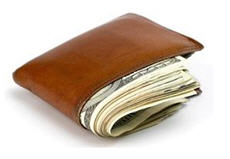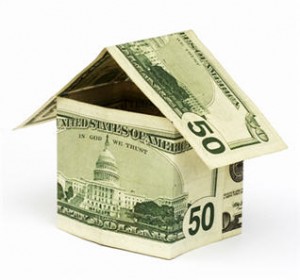My favorite skinny jeans have a tiny hidden pocket. What’s inside it? A small lip gloss, and a neatly folded twenty. An emergency stash. I feel better knowing that it’s there.
 My other jeans? Generally, there are two or three dollars in a back pocket, along with metro tickets – just in case. And I still stash the odd ten or twenty in the leaf of a book or the back of a drawer. No, there’s nothing under the mattress, yet tucking away small amounts for a rainy day is an old habit, and one I’ve kept through a decade of hard times.
My other jeans? Generally, there are two or three dollars in a back pocket, along with metro tickets – just in case. And I still stash the odd ten or twenty in the leaf of a book or the back of a drawer. No, there’s nothing under the mattress, yet tucking away small amounts for a rainy day is an old habit, and one I’ve kept through a decade of hard times.
As a child, I saved every quarter I earned – and earnings came in quarter increments then – babysitting at 50 cents/hour, allowance at 25 cents a week. Typing money came years later, and part-time jobs (thank you stenography class!), with revenues that appeared in tens and twenties. I neatly recorded it all, and kept most of it in cash, in a large yellow envelope, near my bed.
Apparently, there are safes washing up on the shores of Japan, presumably filled with cash. And little means to identify them. One more eerie aspect of last month’s catastrophic events.
According to the article I read, it is not unusual for many in Japan to keep significant portions of their savings at home, in safes. This is posing considerable problems for those trying to recover from the recent devastation.
Do You Stash Your Cash?
There is no planning for the worst of disasters – at least – not in my mind. Not of the epic proportions of something like the tsunami, or far less gargantuan – loss of home, severe illness, loss of job, poor investments. We hedge our bets with insurance policies and “spreading risk” – some of us, keeping a bit of cash at home, in a safe.
No, I don’t have a strong box and nor do I keep money under the mattress. There are only those few bills in my jeans pockets and, I confess, an old sock filled with change. But knowing there’s something in case of emergency makes me feel better. And any other money I have is in the bank, as I imagine yours is, not to mention sunk into my little house which has, naturally, plummeted in value – again, no doubt, like yours.
Money As Safety Net
 Even as a child, I saw money as a tool, not an end unto itself. I was told: If you earn it, you can have it. And so I earned it, worked diligently, felt good about the process, and eventually bought myself a trip to France. I felt “safe” when the dollars were in my possession, and better still, when I transformed them into two months of living abroad.
Even as a child, I saw money as a tool, not an end unto itself. I was told: If you earn it, you can have it. And so I earned it, worked diligently, felt good about the process, and eventually bought myself a trip to France. I felt “safe” when the dollars were in my possession, and better still, when I transformed them into two months of living abroad.
When you lose a job (and your means of support), the emotions are many – panic and loss of esteem among them. But it’s worse than you can imagine – it’s visceral and disorienting – like having the legs knocked out from under you, particularly in a country with little social safety net. When your source of income disappears, when savings disappear, so does any illusion of security.
Teaching Kids About Money
My older son has made his own money since he was six. He wanted a camera; I told him to earn it. A gallery owner I knew “hired” him to vacuum and also to stamp letters. He worked several months, and earned $40 toward an $80 camera. I matched his $40, which was the deal we made.
By age 12, he started his own little Geek Squad, performing a certain amount of computer set up and problem resolution for neighbors. He earned himself a few hundred dollars over the course of two or three years. Now in college full-time, with loans and scholarship, he also works two part-time jobs. He knows the value of every dollar.
But that isn’t the case with my younger son. He’s never been interested, at least not until the past two years. And I realize that I have much still to teach him about money. He is not a spender, but nor is he a saver. He knows what it is to work for funds (he has sold art for several years now), but not in the same tangible, ordered fashion as his brother.
Defining Oneself by Money
I’ve never valued money for its own sake. Perhaps I should have; had I been more money-driven, perhaps I would’ve been smarter when I married and divorced, and also, learned to negotiate for higher salaries during my corporate career. But I’ve never defined myself by square footage, by designer labels, by the make of my car, the assets in my accounts, or the amount of money I was paid.
Many define themselves in precisely these terms. They are no safer from life’s unexpected events such as natural disasters or accidents, but perhaps they are safer in that money provides security, not to mention good medical care. Security, just in case. Whether it’s a lock box or a safe kept in the back of the closet, or that twenty, neatly folded in my jeans pocket.
- Do you define yourself by your earning power?
- Do you stash some cash for a rainy day – or month?
- What are you teaching your children about money?
- If you lost all your assets, would you feel lost?
Having lost my father when I was eight, I’ve never been able to recapture the feeling of security I had as a young child. Money hasn’t helped. In the Samurai prayer are these lines: I have no home. I make awareness my home. I have no means. I make adaptability my means. I think that’s as good as it gets.
Wonderful words, Wolf.
For my kids, their money lessons from me are usually contextual reminders that there is no free lunch, every transaction requires an exchange of some sort. Facebook may be free but it can’t pay for its servers without selling your information and eyeballs. The “free” cell phone isn’t free when you consider the fixed term contract.
Many adults have difficulty understanding how money works; hopefully money becomes the new literacy since just knowing the basics (how compound interest works and financial sales people get paid first) goes a long way in dealing with common financial products.
“Contextual reminders that there is no free lunch.” I love the way you put this, batticus.
I don’t know how old your kids are, but I have found that my two were dramatically different in this as with other things. One was interested in and curious about money (the elder), and the younger couldn’t have cared less if he had an allowance or not. And unfortunately, for many years, an allowance was not in the family budget. And that’s something I regret tremendously, as it’s one of the ways to teach kids about saving, spending, and tracking a planned and regular amount of money.
I’m curious if and how you deal with bank accounts, debit cards, chores for money, discussions of price versus value. (And that latter is something I had to go into quite young with my first-born who had to price his services for his computer business.)